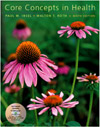Paul M. Insel,
Stanford University School of Medicine
Walton T. Roth,
Stanford University School of Medicine
General Information
|
American Academy of Family Physicians: Pregnancy
(http://familydoctor.org)
Provides information on a variety of health topics, including many aspects of pregnancy and childbirth. |
 |
 |
 |
American Academy of Pediatrics (AAP): You and Your Family
(http://www.aap.org/family)
Provides consumer-oriented health information about infants and young children, including materials relating to SIDS, childhood immunization, and car seat safety. |
 |
 |
 |
American College of Obstetricians and Gynecologists (ACOG)
(http://www.acog.org)
Provides materials on many aspects of preconception care, pregnancy, and childbirth. |
 |
 |
 |
Baby Center
(http://www.babycenter.com)
A commercial site that provides information and advice on all aspects of conception, pregnancy, childbirth, and early childhood. |
 |
 |
 |
BabyWorld
(http://www.babyworld.co.uk)
A commercial site featuring first-person accounts about pregnancy, baby and childcare, breastfeeding, child development, and many other childcare topics. |
 |
 |
 |
CDC Division of Reproductive Health
(http://www.cdc.gov/nccdphp/drh)
A gateway to CDC information relating to maternal health, men's and women's reproductive health, assisted reproduction, and related topics. |
 |
 |
 |
CDC National Center for Birth Defects and Developmental Disorders
(http://www.cdc.gov/ncbddd)
Provides information about a variety of topics related to birth defects, including fetal alcohol syndrome and the importance of folic acid. |
 |
 |
 |
CDC Infants' and Children's Health Page
(http://www.cdc.gov/health/nfantsmenu.htm)
Provides information on prenatal care, birth defects, breastfeeding, and other related topics. |
 |
 |
 |
CDC National Immunization Program
(http://www.cdc.gov/nip)
Includes information on recommended childhood immunizations. |
 |
 |
 |
Childbirth.Org
(http://www.childbirth.org)
Contains medical information and personal stories about all phases of pregnancy and birth, including labor resources with material on pain relief and different methods of prepared childbirth. |
 |
 |
 |
Generational Health
(http://healthygenerations.com)
Helps you create a family tree online and provides information about detection and screening for common health conditions that run in families. |
 |
 |
 |
I Am Your Child
(http://www.iamyourchild.org)
Provides resources and information about child development from the prenatal period to age three. |
 |
 |
 |
It's Just Another Baby
(http://www.westnet.com/~crywalt/pregnancy)
One couple's personal story about infertility, pregnancy, and childbirth. |
 |
 |
 |
La Leche League International
(http://www.lalecheleague.org)
Provides advice and support for breastfeeding mothers. |
 |
 |
 |
The March of Dimes
(http://www.modimes.org)
Provides public education materials on many pregnancy-related topics, including preconception care, genetic screening, diet and exercise, and the effects of smoking and drinking during pregnancy. |
 |
 |
 |
Maternal and Child Health Bureau
(http://www.mchb.hrsa.gov)
Information and links about pregnancy and early childhood; online publications include brochures about prenatal care and breastfeeding, as well as a two-part, downloadable booklet called Health Diary: Myself, My Baby (part 1, part 2) to help pregnant women track their prenatal care and parents track their infant's health. |
 |
 |
 |
MedlinePlus: Pregnancy and Reproduction
(http://www.nlm.nih.gov/medlineplus/pregnancyandreproduction.html)
Includes links to information on a wide variety of topics related to pregnancy, including prenatal care, pregnancy loss, labor and delivery, and infertility. |
 |
 |
 |
National Institute of Child Health and Human Development
(http://www.nichd.nih.gov)
Provides information about reproductive and genetic problems; sponsors the "Back to Sleep" campaign to fight SIDS. |
 |
 |
 |
National Network for Child Care: Nutrition
(http://www.nncc.org/Nutrition/nutr.page.html)
Provides information about nutrition issues relating to pregnancy, infancy, and childhood; includes a number of articles on breastfeeding. |
 |
 |
 |
ParentsPlace.com Pregnancy Department
(http://www.parentsplace.com/pregnancy)
Includes a pregnancy calendar, a due date calculator, and lots of advice on preparing a birth plan and other pregnancy topics. |
 |
 |
 |
Safe Motherhood
(http://www.safemotherhood.org)
Provides information about the issues surrounding safe and health pregnancy and childbirth around the world. |
 |
 |
 |
SIDS Alliance
(http://www.sidsalliance.org)
Provides information about sudden infant death syndrome (SIDS) and resources for families affected by SIDS. |
 |
 |
 |
USDA Center for Nutrition Policy and Promotion
(http://www.usda.gov/cnpp)
Produces an annual report on the cost of raising a child and provides information about the cost for families of implementing national dietary recommendations. |
 |
 |
 |
Virtual Children's Hospital
(http://www.vh.org/VCH)
Provides information on a variety of children's health concerns. |



 2002 McGraw-Hill Higher Education
2002 McGraw-Hill Higher Education